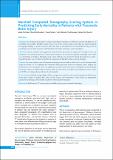Please use this identifier to cite or link to this item:
https://hdl.handle.net/20.500.14356/1040Full metadata record
| DC Field | Value | Language |
|---|---|---|
| dc.contributor.author | Chitrakar, Akash | - |
| dc.contributor.author | Rajbhandari, Binod | - |
| dc.contributor.author | Sedain, Gopal | - |
| dc.contributor.author | Pradhananga, Amit Bahadur | - |
| dc.contributor.author | Sharma, Mohan Raj | - |
| dc.date.accessioned | 2023-04-20T09:25:01Z | - |
| dc.date.available | 2023-04-20T09:25:01Z | - |
| dc.date.issued | 2022 | - |
| dc.identifier.citation | ChitrakarA., RajbhandariB., SedainG., PradhanangaA. B., & SharmaM. R. (2022). Marshall Computed Tomography Scoring System in Predicting Early Mortality in Patients with Traumatic Brain Injury. Journal of Nepal Health Research Council, 20(01), 202-206. https://doi.org/10.33314/jnhrc.v20i01.3806 | en_US |
| dc.identifier.issn | Print ISSN: 1727-5482; Online ISSN: 1999-6217 | - |
| dc.identifier.uri | http://103.69.126.140:8080/handle/20.500.14356/1040 | - |
| dc.description | Original Article | en_US |
| dc.description.abstract | Abstract Background: Traumatic brain injury is common neurological emergency worldwide associated with high rates of morbidity and mortality. Marshall scoring system is one of the several scoring systems that uses initial computed tomography findings to predict outcome. This study aims to determine the role of Marshall scoring system in predicting early mortality in patients with Traumatic brain injury in Nepalese patient population. Methods: Patients admitted with diagnosis of Traumatic brain injury between August 2017 and July 2018 in our institution were studied prospectively. Clinical status of patient was noted and computed tomography scan of head was interpreted according to Marshall scoring system. Patients were monitored during the hospital stay and in-hospital mortality was correlated with different components of Marshall scoring system at discharge. Results: The most common cause of Traumatic brain injury was road traffic accident (45%). Severe Traumatic brain injury was noted in 17% of patients and commonest intracranial mass lesion was contusion (24%). Surgery was performed in 29% of patients. There was significant correlation between increase in Marshall score and mortality (p<0.001). Degree of midline shift (p<0.016), status of basal cisterns (p<0.001), and combination of mass lesions (p=0.005) were independent predictors of early mortality. Conclusions: Marshall scoring is highly reliable scoring system to predict early mortality in patients with Traumatic brain injury. Degree of midline shift, status of basal cisterns, and combination of mass lesions are independent parameters predicting early mortality in patients with traumatic brain injury. Keywords: Basal cistern; CT scoring system; marshall scoring system; traumatic brain injury | en_US |
| dc.language.iso | en | en_US |
| dc.publisher | Nepal Health Research Council | en_US |
| dc.relation.ispartofseries | Jan-March, 2022;3806 | - |
| dc.subject | Basal cistern | en_US |
| dc.subject | CT scoring system | en_US |
| dc.subject | marshall scoring system | en_US |
| dc.subject | traumatic brain injury | en_US |
| dc.title | Marshall Computed Tomography Scoring System in Predicting Early Mortality in Patients with Traumatic Brain Injury | en_US |
| dc.type | Journal Article | en_US |
| local.journal.category | Original Article | - |
| Appears in Collections: | Vol. 20 No. 01 (2022): Issue 54 Jan-March, 2022 | |
Files in This Item:
| File | Description | Size | Format | |
|---|---|---|---|---|
| 3806-Manuscript-27893-1-10-20220606.pdf | Fulltext Download | 291.21 kB | Adobe PDF |  View/Open |
Items in DSpace are protected by copyright, with all rights reserved, unless otherwise indicated.
